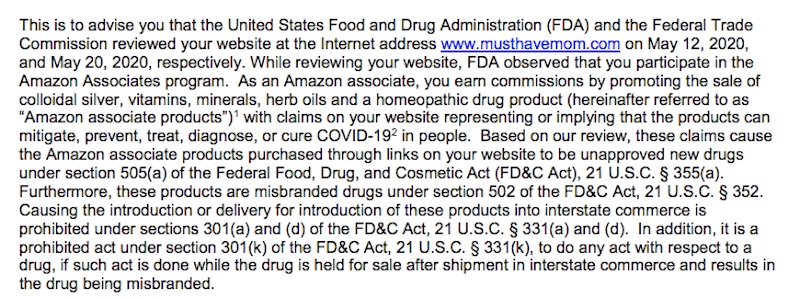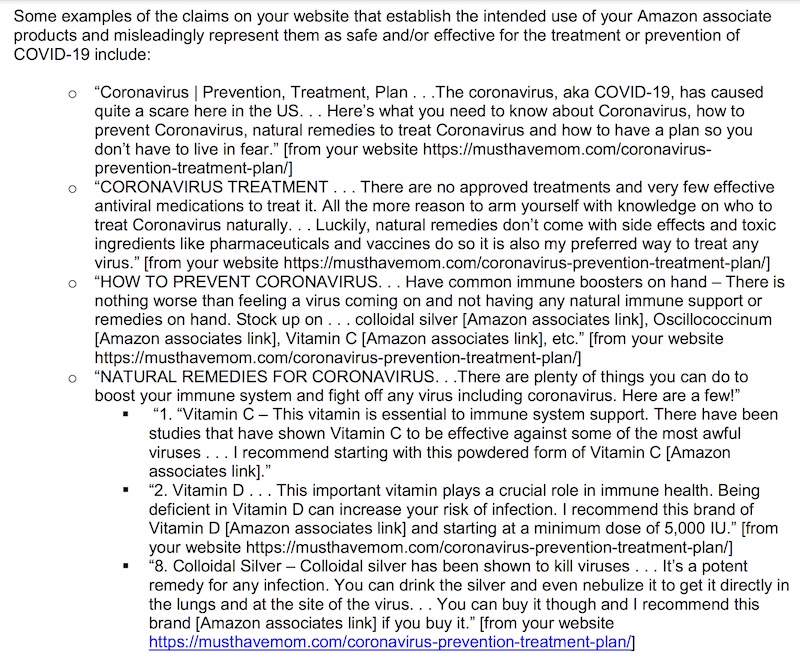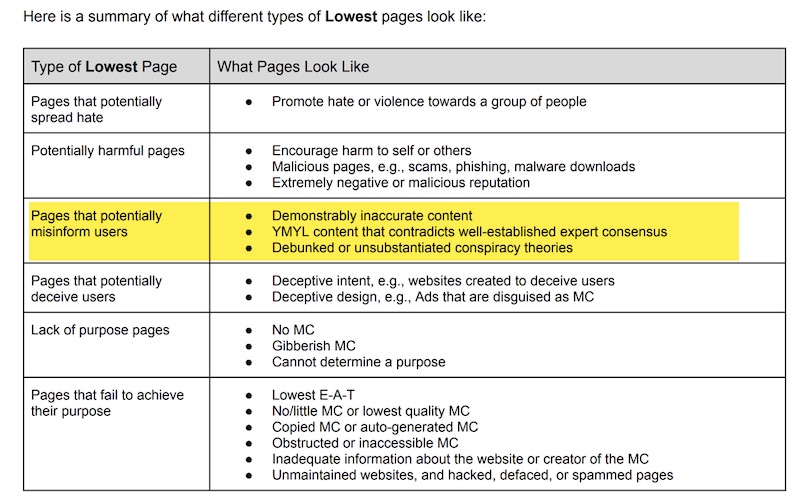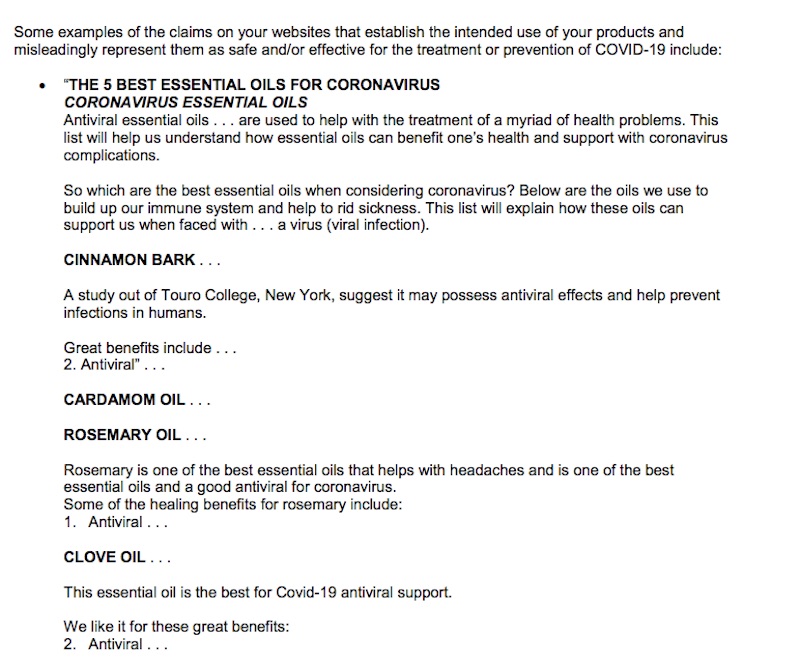John Mueller recently tweeted saying that most likely there is overlap between what the Federal Trade Commission keeps an eye out for and what Google’s algorithms look at as well:
https://twitter.com/JohnMu/status/1374451915933642752?s=20
He went on to say that “a lot of the examples I saw while looking around were pretty bad, and I’d hope we catch some of the associated signals for search.
We thought it would be interesting to look at some of the websites listed by the FTC as receiving a warning letter. We found several businesses with issues that a Google Quality Rater would likely flag as low quality in some way. We’ll share an example shortly.
Most of the warnings given were for making false medical claims in connection with Covid-19. It was interesting to see that even blogs with Amazon Affiliate links received FTC warnings.
For example, this affiliate site received an FTC letter warning them that their links pointing to Amazon caused people to buy products that claimed to mitigate, prevent, treat, diagnose or cure COVID-19.

The pages have since been removed, and are not available on archive.org, but here are some excerpts from the FTC letter.

If you are given an FTC warning like this, you have 48 hours to reply with a solid plan for fixing the issues described.

If you are advertising a product that prevents, treats or cures a human disease, you are breaking the law unless you have sufficient and substantial evidence to back those claims up. Affiliate links fall into this category too.
If you have a site that discusses medical advice and either sells or recommends products, take note!
Similarities between the FTC warnings and the QRG
We care about Google’s Quality Raters Guidelines because they represent what Google is trying to accomplish with their algorithms. In a Google Help Hangout from March of 2021, John Mueller was asked about a site that suffered a traffic drop after a core update. He said, “I would look at the Quality Rater Guidelines and really think about how your site might be perceived by the quality raters. The quality raters don’t make the algorithms, but they do give us a lot of insight into what we might do in our algorithms, so I would strongly recommend going through that.” Also, Google’s blog post on what site owners need to know about core updates recommends that we read the QRG for ideas on our sites’ value in Google’s eyes.
We thoroughly believe that if something is in the QRG, it is something that Google is trying to accomplish with their algorithms. Much of our current SEO advice to our clients is based on trying to help a business have a website that would be rated as high quality by a Google Quality Rater.
While Quality Raters Guidelines do not say the exact same thing as FTC regulations, there are several sections that give us hints as to what Google’s algorithms are likely evaluating when it comes to trusting medical content on the web. For medical content to be seen as trustworthy, it needs to be written by people with appropriate expertise and represent scientific consensus.
![]()
If you are a website that is recommending a product to treat a medical condition, then you’ll need to have content that is either expert written or at least reviewed by someone with appropriate medical expertise if you want to have a chance at ranking well on Google.
This is emphasized throughout the QRG.



Quality Raters are told to rate a page as lowest in terms of quality even if the creator of the content thoroughly believes what they are writing is true.

If you’ve had great success with a treatment, a diet, or supplement of some sort and want to publish a website on that subject, know that in today’s Google algorithm, you are unlikely to be able to get this content ranking well unless you can become widely known, and recognized by other experts as an authority on the subject.
What sites that publish medical content need to know
We do not think that FTC warning letters are factored into Google’s algorithms. We did look at SEMrush and Ahrefs historical charts for many of the websites that received these letters. Several had massive declines with core updates, but most never did rank well on Google.
Still, we think there are lessons to be learned in looking at the type of content that was flagged by the FTC in these letters. Sites that write on medical topics are held to a higher scrutiny by both the FTC and Google. If Google is asking their quality raters to determine whether content is expert written, or contradicting expert consensus, then they are likely trying to determine this algorithmically as well.
A couple of years ago, after seeing so many alternative medical sites decline in rankings following the June 3, 2019 core update, we published some theories on how Google could be determining whether a site had information that contradicted expert level consensus. Hopefully soon I’ll be able to expand on those theories. (Hint: We have been learning a lot at MHC about Google’s use of entities, and entity associations in the knowledge graph.)
Most of you who are reading this article are likely not trying to promote wildly harmful conspiracy theories. You probably are not recommending carrot juice to cure cancer. But many are recommending treatments you believe to be good and helpful, despite the lack of scientific evidence to support those beliefs. Look at this example we pulled from one FTC letter:

This article recommended natural treatments and even backed the recommendations up with studies stating that “A study out of touro College, New York, suggests that [cinnamon bark] may possess antiviral effects.” A suggestion in a study is not the same as saying that medical experts agree that cinnamon bark is an effective antiviral treatment for Covid-19. Selling a cinnamon bark supplement to help people protect against a virus is not legal, and likely is not content Google would want to promote. While this author likely thoroughly believes this is true, and while there are likely others in the world who agree with them, if there is no reputable content in Google’s knowledge graph to support these claims, then this content is not likely to rank well.
With all of this in mind, here is our advice, based on the QRG and Google’s blog post on core updates, for websites that write on medical topics, and especially those that recommend products via sales on your site or affiliate links.
- Someone with appropriate medical expertise needs to either write any articles recommending medical products, or, in some cases, it may be enough to have an expert quote or contributor.
- If you state a medical fact that can be backed up with a scientific reference, you should reference it. We prefer in-line citations, but a list of references after your article may be sufficient.
- Be careful not to hand pick references that loosely support your point. A study that suggests that perhaps cinnamon has antiviral effects is not enough evidence to support you selling cinnamon supplements to people who want to ward off viruses.
- If only some of your medical content on your site is controversial and not thoroughly backed by expert consensus, it may be helpful to move that content to its own folder or subdomain. There is more on this in our whitepaper, available for purchase on our recommendations for alternative medical sites or other sites that contradict scientific consensus.
If you enjoyed this, you will love our newsletter. Every week we publish the latest news you need to know on SEO along with Marie and the MHC team’s thoughts on Google’s algorithms.
Sign up here:



Comments
Great article, on the topic of Affiliate links, be they amazon or anotehr company and given the August 2021 do you recommend that we mark our affiliate links as Rel=Sponsored or Rel=NoFollow?
Or just leave them as is?